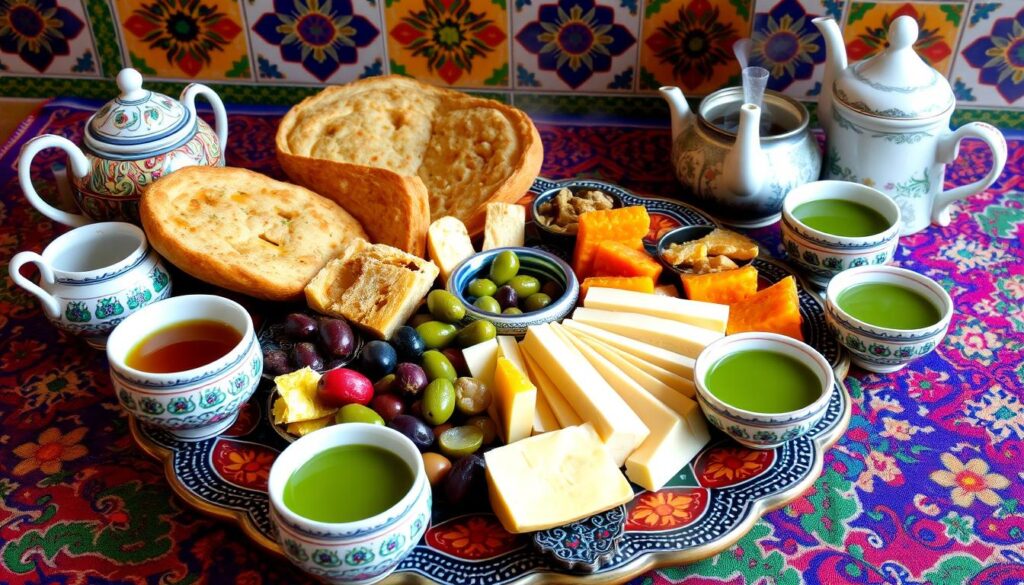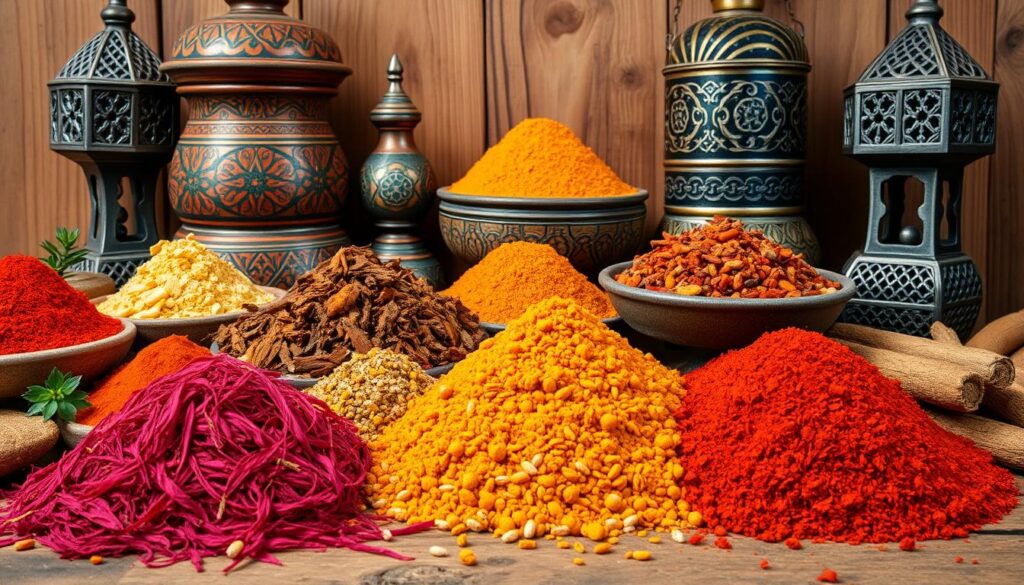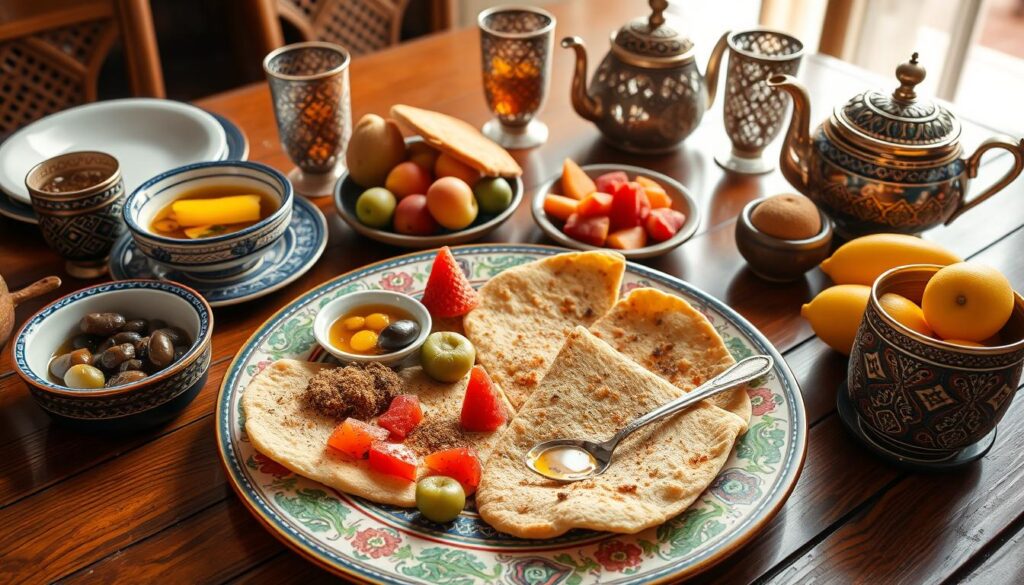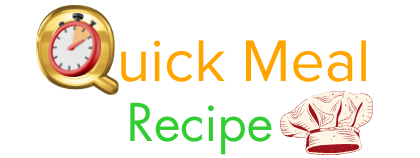Ever thought about how a traditional Moroccan breakfast could change your morning? Known as “lftour,” it’s a colorful mix of flavors and textures. It’s a big difference from the usual breakfasts we see every day.
In North Africa, breakfast is key to starting the day right. It’s not like the big meals later in the day. Moroccan breakfasts are light, with fresh ingredients and tasty flavors. You’ll see how each dish not only feeds you but also brings families together.

Discover the variety of breads, spreads, and drinks that make up a Moroccan breakfast. It’s not just about food; it’s about the culture and heritage it brings to the table.
Key Takeaways
- A traditional Moroccan breakfast, or “lftour,” features light meals compared to heavier lunches and dinners.
- Common breakfast items include breads such as Khobz and various flavorful spreads like olive oil and honey.
- Mint tea serves as a quintessential beverage that enhances the Moroccan breakfast experience.
- Breakfast is a social occasion in Morocco, often enjoyed with family and friends.
- Fresh, local ingredients highlight the rich culinary heritage found in Moroccan cuisine.
Understanding Moroccan Breakfast Culture
The breakfast culture in Morocco is deeply rooted in Moroccan culture. It values family, community, and a wide variety of dishes. Bread is the mainstay of meals, including breakfast, thanks to communal baking traditions. Breakfasts often have many dishes, mixing traditional Moroccan dishes with French influences.
Mint tea is Morocco’s national drink, symbolizing hospitality and unity. It’s called “Moroccan whiskey” and is served at family gatherings. Mint tea’s aroma adds warmth and connection to breakfast.
Freshly squeezed orange juice is also a favorite, loved for its taste and health benefits. Oranges are common in Morocco, offering a boost of vitamin C. These drinks are key to a lively and satisfying breakfast.
Moroccan women put a lot of effort into making breakfast from scratch. This ensures each meal is full of flavor. Sharing meals strengthens bonds and creates a sense of community.
In short, Moroccan breakfast is about friendship and delicious flavors. It offers a unique breakfast food traditions expérience for everyone.
Typical Moroccan Breakfast Options
Starting your day with a Moroccan breakfast is a treat. It’s filled with wholesome flavors and textures. You’ll find fresh breads, tasty spreads, and sweet pastries. These dishes are both satisfying and energizing, making them great for a healthy start.
Common Bread Choices: Khobz and Baguettes
Bread is key in a Moroccan breakfast. Khobz, a crusty round bread, is everywhere. It’s perfect for dipping or scooping. Baguettes, influenced by French cuisine, also make an appearance. These breads add to the fun of enjoying dips and spreads, making breakfast both nutritious and filling.
Popular Spreads: Olive Oil, Cheese, and Honey
Olive oil is a must in Moroccan breakfasts. It’s often paired with cheese, honey, or jams. The extra virgin olive oil adds a rich flavor. You might find cheeses like “La Vache Qui Rit” or local ones that pair well with the olive oil. Honey adds sweetness to the bread, adding to the variety of flavors.
Delightful Pastries and Sweets
No breakfast is complete without traditional pastries like msemmen and baghrir. Msemmen is a thin, layered pancake, and baghrir is spongy with holes. They’re often served with butter and honey. Baked treats with almonds and coconut add a sweet touch. These options not only please the taste buds but also offer healthy choices for a great start to the day.
| Item | Description | Nutritional Benefit |
|---|---|---|
| Khobz | Traditional round bread | High in fiber |
| Baguette | Crispy French-style bread | Source of carbohydrates |
| Olive Oil | Extra virgin for dipping | Rich in healthy fats |
| Cheese | Various types available | Good protein source |
| Honey | Natural sweetener | Energy booster |
| Msemmen | Layered pancake | Provides energy |
| Baghrir | Spongy pancake with holes | Easy to digest |
Authentic Moroccan Flavors and Spices
Discover the vibrant world of Moroccan breakfast. It’s filled with unique flavors and spices that make mornings special. Moroccan breakfasts are more than just food; they’re a celebration of life.
At the heart of these breakfasts is mint tea. It’s a favorite drink enjoyed by many. It adds a special touch to the meal.
The Role of Mint Tea in Moroccan Cuisine
Mint tea is key to Moroccan hospitality. It’s called “Moroccan whiskey” because of its sweet taste. This tea, made with green tea and mint, is perfect with breakfast.
Making mint tea is a tradition. It’s served in decorative glasses. This shows the warmth and friendship of Moroccan culture.
Unique Dishes and Ingredients in Breakfast
Moroccan breakfasts feature standout dishes. Msemen, a flaky bread, is served with honey or butter. Baghrir, or “thousand-hole pancakes,” is another favorite, often with honey.
Pastries like chebakia and sfenj add sweetness to your meal. They’re crispy and fluffy.
B’ssara, a fava bean soup, is comforting in cold weather. Eggs, seasoned with Moroccan spices, are also a hit. They’re topped with tomatoes and onions. Orange juice adds a refreshing touch to the meal.

Moroccan breakfasts offer a mix of textures and flavors. They invite you to share meals with others. Traditional dishes combine sweet pastries, savory foods, spices, and fresh ingredients. This creates a memorable feast that celebrates Morocco’s rich food culture.
Healthy Breakfast Options with Moroccan Cuisine
Exploring Moroccan breakfasts can give you many healthy breakfast ideas. These meals are full of flavors and health benefits. They mix carbs, fats, and proteins for a great start to your day.
Nutritional Benefits of Moroccan Breakfast Dishes
Many Moroccan dishes use fresh ingredients like whole grains and healthy fats. For example, wheat berries in hrbil are full of fiber. Olive oil adds good fats. Fruits and legumes add vitamins and minerals.
Incorporating Fresh Ingredients and Fruits
Seasonal fruits are key in Moroccan breakfasts, adding sweetness and hydration. Oranges, bananas, and figs are often used. Using local, fresh produce boosts flavor and supports sustainable eating.
| Ingredient | Nutritional Benefit |
|---|---|
| Wheat Berries | High in fiber, promoting digestion |
| Olive Oil | Rich in healthy fats for heart health |
| Fruits | Packed with vitamins and antioxidants |
| Legumes | Good source of protein and fiber |
Moroccan Breakfast Recipes to Try at Home
Discover the rich flavors of Moroccan breakfast with these recipes. They bring authentic Moroccan tastes into your kitchen. Enjoy the vibrant culture of Morocco with every bite.
Step-by-Step Guide to Making Baghrir
Baghrir, or Moroccan pancakes, are loved for their holes that soak up syrup. To make them, you’ll need:
- 1 cup fine semolina
- 1/2 cup all-purpose flour
- 2 tablespoons sugar
- 1 teaspoon instant yeast
- 1/2 teaspoon salt
- 2 cups warm water
Mix semolina, flour, sugar, yeast, and salt in a bowl. Add warm water slowly, whisking until it’s smooth. Let the batter rest for 30 minutes to rise.
Heat a non-stick pan over medium heat. Pour batter into the pan and cook until bubbles form. Remove from heat and serve with butter and honey.
Classic B’ssara Soup Recipe
B’ssara is a creamy fava bean soup loved in Morocco. It’s full of flavor and good for you. Here’s how to make it:
- 1 cup dried fava beans
- 3 cups water
- 2 cloves garlic, minced
- 1 teaspoon cumin
- 1/2 teaspoon paprika
- Salt and pepper to taste
- Olive oil for drizzling
- Fresh bread for serving
Soak fava beans overnight, then drain and mix with water, garlic, cumin, paprika, salt, and pepper. Simmer until tender, then blend until creamy. Drizzle with olive oil and serve with fresh bread.
These recipes bring authentic Moroccan flavors to your breakfast. Enjoy a taste of Morocco right at home.

Conclusion
A traditional Moroccan breakfast, or “ftour,” is a mix of flavors that makes mornings special. It includes khobz, m’semen, and tasty pastries. This breakfast is more than just food; it’s about family and community.
Exploring Moroccan breakfasts, you’ll find healthy options and recipes to try at home. Mint tea and dairy products like yogurt add to the experience. Using local ingredients like honey and fruits makes meals even better.
By adding Moroccan breakfasts to your day, you enjoy more than just food. You also connect with the stories and traditions behind it. Choosing your favorite dishes or trying new recipes brings Morocco into your kitchen. It makes your meals more than just food; it’s a journey.
FAQ
What is a traditional Moroccan breakfast like?
A traditional Moroccan breakfast, called “lftour,” is a colorful mix of fresh, local tastes. It includes light foods like khobz (crusty bread), olive oil, olives, cheese, and fruits. It’s not just about eating; it’s a time for family to come together.
What are common components of a Moroccan breakfast?
A Moroccan breakfast often has fresh bread, pastries like m’smen and baghrir, and spreads like olive oil and honey. You’ll also find cheese, mint tea, and fruits. This mix of flavors and textures is delightful.
Why is bread so important in Moroccan breakfast culture?
Bread is key in Moroccan meals, including breakfast. It helps share food and shows community bonds. Making bread together is a big part of Moroccan family traditions.
Can Moroccan breakfast dishes be healthy?
Yes, Moroccan breakfasts are often healthy! They include whole grain bread, olive oil, fruits, and legumes. These foods are full of fiber, healthy fats, vitamins, and minerals, making them great for starting your day.
What are some unique breakfast dishes in Morocco?
In Morocco, you can find dishes like b’ssara, a fava bean soup, and khlii, dried meat for omelets. Spices like cumin and paprika add flavor. These dishes make a Moroccan breakfast special.
How do you make baghrir at home?
To make baghrir, mix semolina, flour, sugar, and yeast for a rising batter. Cook it in a hot pan until it’s bubbly and done. Serve it warm with butter and honey for a treat.
What is the significance of mint tea in a Moroccan breakfast?
Mint tea, or “Moroccan whiskey,” is a big part of breakfast in Morocco. It’s a sweet green tea with fresh mint. Drinking it is a sign of welcome and strengthens family bonds during meals.
How can I incorporate more fresh ingredients into a Moroccan breakfast?
To add fresh ingredients, try adding fruits like oranges, bananas, and figs to your breakfast. Using local produce makes your meal more natural and refreshing.
Source Links
- https://autoimmunewellness.com/moroccan-breakfast-skillet/ – Moroccan-Inspired Breakfast Skillet – Autoimmune Wellness
- https://www.moroccopedia.com/best-of-moroccan-breakfast/ – Best of Traditional Moroccan Breakfast
- https://theculturetrip.com/africa/morocco/articles/10-mouthwatering-moroccan-breakfasts-to-try – 10 Mouthwatering Moroccan Breakfasts To Try
- https://www.requestrecipes.com/recipes-2/ – Moroccan Breakfast Menu : Beverages – Request Recipes
- https://epicureandculture.com/morocco-food-culture-moroccan-cooking/ – Morocco Food Culture: Why Moroccan Cooking Is An Expression Of Love
- https://www.journeybeyondtravel.com/blog/morocco-food.html – Food Traditions in Morocco
- https://mykingsgate.co.za/info/moroccan-breakfast-recipes-32955/ – Moroccan Breakfast Recipes: Start Your Day with Delicious Flavors – Kingsgate Lifestyle
- https://en.wikipedia.org/wiki/Moroccan_cuisine – Moroccan cuisine
- https://domesticfits.com/moroccan-food/ – Moroccan Food: 29 Popular Dishes in 5 Categories – Domestic Fits
- https://marocmama.com/moroccan-breakfast-recipe-hrbil/ – My Favorite Moroccan Breakfast: Hrbil
- https://www.halfbakedharvest.com/the-perfect-moroccan-brunch/ – The Perfect Moroccan Brunch.
- https://marocmama.com/moroccan-breakfast-ideas/ – Moroccan Breakfast Ideas Worth Waking Up For!
- https://epicureandculture.com/traditional-moroccan-breakfast-foods-recipes/ – 7 Traditional Moroccan Breakfast Foods (With Easy Recipes!)
- https://www.savoringthegood.com/moroccan-breakfast-recipes/ – Moroccan Breakfast Foods
- https://marrakechwonders.com/moroccan-breakfast-spots/ – Traditional Moroccan breakfast spots: starting your day with authentic flavors
- https://www.theworldinmypocket.co.uk/traditional-moroccan-food/ – Discover the Aromatic Flavours of the Traditional Moroccan Food – The World in My Pocket
- https://www.story-rabat.com/magic-of-moroccan-food/ – Moroccan Food – The best mixture of Asian and Mediterranean
